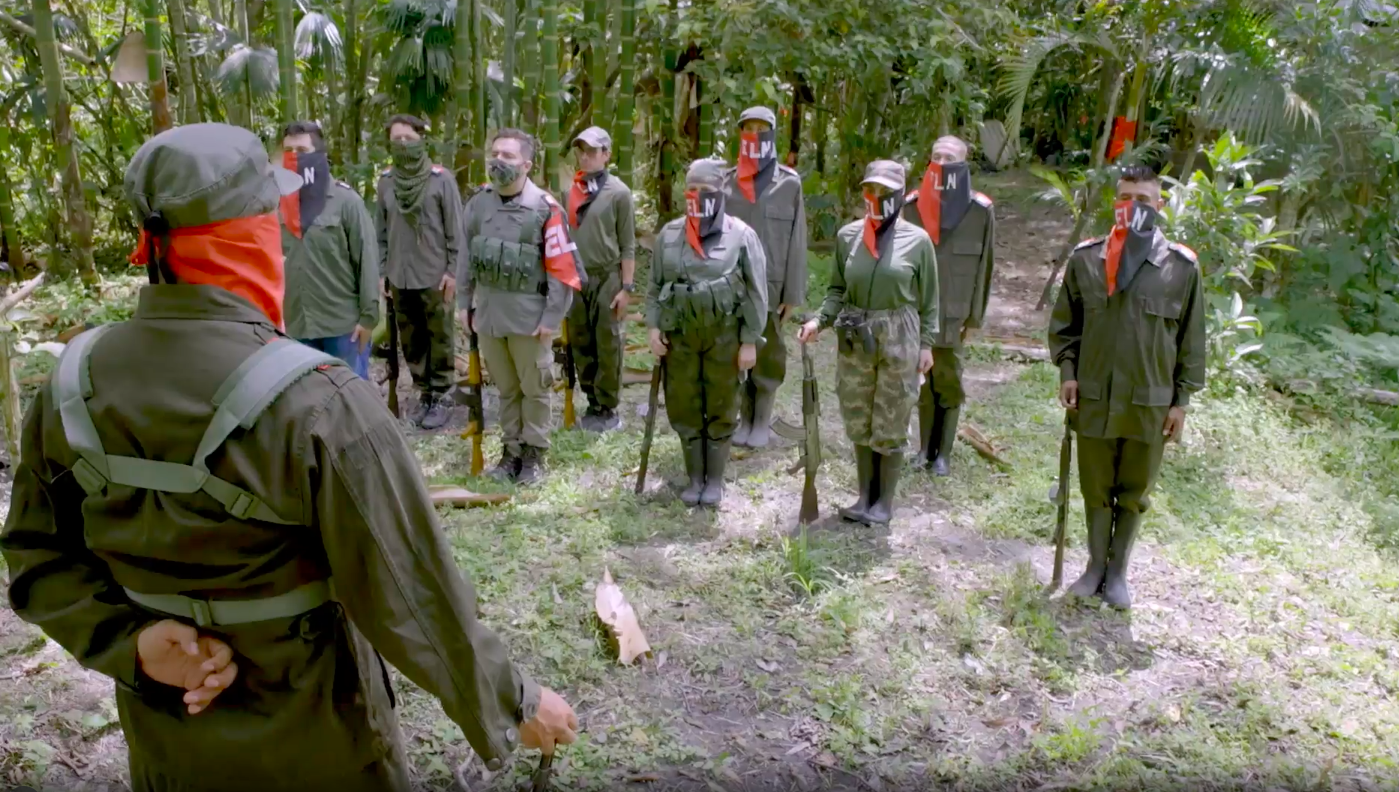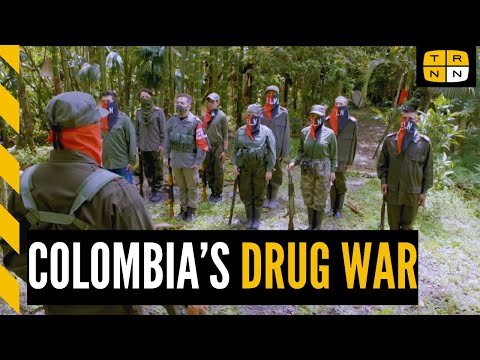In Colombia’s Cauca Valley, the drug war is flaring once again amid. In 2016 the FARC, Colombia’s largest armed revolutionary group, entered into peace negotiations with the government. At the time, 60 percent of Colombia’s coca cultivation occurred in FARC-controlled territories. FARC’s entry into the peace process left a vacuum now being filled by organized crime. Without a comprehensive state-led effort to substitute coca cultivation and provide employment for millions of young people, the drug trade remains the only path to survival for many Colombians. The Real News reports from Colombia, embedding with FARC fighters who are once again picking up the gun, members of the Golfo Cartel overseeing the production of cocaine, and the ELN, which is waging a war against narco-traffickers as part of its program of socialist revolution.
Filmed & Edited by Rodrigo Vázquez-Salessi
Producer in Colombia Juan Pablo Morris
Music by Mariano Escudero
Produced by Bethnal Films
Transcript
Rodrigo Vazquez-Salessi (narrator): Violence and murder are on the rise in Colombia.
ELN Guerrilla Commander Alias Torres: Colombia’s conflict in a nutshell. Cocaine stained with people’s blood.
Rodrigo Vazquez-Salessi (narrator): The 2016 peace deal is under threat as militias fight to control the cocaine trade. Young people are joining the ranks of armed groups…
ELN Guerrilla Fighter: Democracy isn’t working.
ELN Guerrilla Fighter: What other option is there?
Rodrigo Vazquez-Salessi (narrator): … and turning to crime in city streets.
Siloe Heights Gang Member: Obviously because the government doesn’t give us chances to work. We do whatever we have to do.
Rodrigo Vazquez-Salessi (narrator): Those who once believed in peace are now joining the fight, as a new generation of rebels emerge.
Dissident FARC Carlos Patiño Fighter: Cash and guns is what we have! There’s no other way to defend ourselves.
Rodrigo Vazquez-Salessi (narrator): Now ordinary Colombians are finding themselves caught in the crossfire of this brutal narco-war.
Farmer: You’re in trouble if you mess with the coca mafia.
Farmer 2: Be careful with these images, you hear?
ELN Guerrilla Commander Alias Torres: Left! Align! Present arms! At ease!
Rodrigo Vazquez-Salessi (narrator): The National Liberation Army has been fighting for a Marxist revolution in Colombia for nearly 60 years. But today these fighters are training to take on a different enemy: the narcotraffickers terrorising the country.
ELN Guerrilla Commander Alias Torres: As you already know, our insurgency steers clear from the narco-trafficking business. Not only because it was designed by the CIA and the Pentagon, but also because it destroys the local farmers’ economy. So we must confront it militarily.
ELN Guerrilla Commander Alias Torres: Arms! Colombia!
ELN Guerrilla Fighters (shout): For the workers!
ELN Guerrilla Commander Alias Torres: Fall out!
Rodrigo Vazquez-Salessi (narrator): Known as the ELN, the guerrillas say their ranks have swelled with young recruits disillusioned by the government’s failure to provide peace and prosperity.
ELN Guerrilla Commander Alias Torres: What we’ve got here is a consensus among the young about what’s happening in this country. And what they are finding is that the path of popular armed resistance is an alternative way to find a new project for this country,
which is what young people are clamouring for.
Rodrigo Vazquez-Salessi (narrator): ELN Guerrilla Commander Alias Torres trains recruits.
ELN Guerrilla Commander Alias Torres: These guys are discovering that armed struggle is a way to confront capitalism, which is destroying our lives in this country.
ELN Guerrilla Commander Alias Torres: Check it. Always make sure that you don’t point it at your comrades.
ELN Guerrilla Commander Alias Torres: Load! Fire!
Rodrigo Vazquez-Salessi (narrator): How do you feel?
ELN Guerrilla Fighter: I feel good, with an attitude!
ELN Guerrilla Fighter 2: Democracy isn’t working. I think this is the best, maybe the only way to change the country.
ELN Guerrilla Fighter 3: What other opHon is there? It scares me a bit.
ELN Guerrilla Fighter 4: Democracy doesn’t just mean participating in politics. Democracy means everybody must have access to our resources. In Colombia, those resources… They benefit who, dude?
ELN Guerrilla Commander Alias Pablo: Those linked to the drug cartels because it’s the most lucrative industry, are the powerful who dominate us. Especially the imperialists. With the aim of funding the counter-insurgency wars. The other insurgencies are
unwilling to combat and to act against the narcos, it’s down to us to do it militarily.
ELN Guerrilla Commander Alias Torres: Remember: preserving one’s life is the most
important thing.
ELN Guerrilla Fighter 3: The journalist stays here.
ELN Guerrilla Commander Alias Torres: Colombia’s conflict in a nutshell. Cocaine stained with people’s blood. Mission accomplished guys!
ELN Guerrilla Commander Alias Torres (to camera): I hope this proves that we’re the only ones waging this war even against the State’s wishes. The ELN is the only one in combat against it.
Rodrigo Vazquez-Salessi: Thank you Commander.
ELN Guerrilla Commander Alias Torres: Let’s go guys.
AGC Commander Alias Restrepo: We’re in the process of producing cocaine. Our comrade here is mixing petrol, used and new, with coca leaves treated with lime. You stir it and the next day we obtain the “cheese” or paste that will be crystalized. Here we’re dry-cleaning it and then Karla packs it up.
Rodrigo Vazquez-Salessi: How much money in product do you have here now?
AGC Commander Alias Restrepo: We have more than $200,000 USD, including our partners’ fee. Narco-trafficking is a highly profitable activity, both for the farmers and for us, who head the business side. We’re doing what the State isn’t, bringing money to the people that the State has forgotten. We like working with farmers, as long as they follow the rules. But those who don’t know how to cooperate or spill information, are dealt with.
AGC Fighter: Go, go!
Rodrigo Vazquez-Salessi (narrator): Many Colombians were more optimistic about their future in 2016, when the government signed a treaty with the Revolutionary Armed
Forces of Colombia, better known as the FARC, to end decades of conflict. But the government’s failure to deliver on key promises has led thousands of former fighters to
mobilise again.
Dissident Farc 2nd Generation Fighter: Are you the journalist? Get out of the vehicle. Walk.
Rodrigo Vazquez-Salessi (narrator): Leonidas Espartaco was a sniper in the FARC, before he disarmed as part of the peace deal.
FARC 2nd Gen. Commander Leonidas Espartaco: The 2016 peace deal wasn’t put into action. It was a pipe dream. The State didn’t enforce it. Our own comrades abandoned it too. When their projects were ignored, they left. They got armed and attacked our demobilised units and our people… And they attacked me. The attempt didn’t scare me,
it motivated me more.
The farmer will continue growing coca unless the State subsidises crop subsitution. And we obviously are not involved with narco-trafficking. Although we shall depend on taxing illicit coca farms and drug-traffickers. That’s our source of income.
[Off camera] Fireworks? Rockets? Let’s see if we need to shoot back from here! Let’s shoot back and get out of here!
Rodrigo Vazquez-Salessi (narrator): Before it disbanded in 2016, the FARC controlled 60% of drug-trade in Colombia. Now more than a dozen groups are fighting to fill the vacuum it left behind.
Dissident FARC Carlos Patiño Fighter: Bring the booze and get the girls to undress damnit! Cash and guns is what we have!
Rodrigo Vazquez-Salessi (narrator): As many as 10,000 fighters are estimated to have joined militias like the Carlos Patiño Front that compete for control of coca production.
Dissident FARC Carlos Patiño Fighter: Maria, good afternoon! How are you? Pedro, how are you? How have you been? Lots of work?
Pedro: Yes I’m working.
Dissident FARC Carlos Patiño Fighter: Alright then. You know what I’m coming for
right?
Pedro: Yes of course.
Dissident FARC Carlos Patiño Fighter: Many thanks! I’ll come back in 15 days.
Pedro: Alright.
Dissident FARC Carlos Patiño Fighter: It’s for your security and that of your family. See you soon! All the best!
Pedro: See you later.
Rodrigo Vazquez-Salessi (narrator): The 2016 peace deal was meant to bring economic development and to substitute crops in rural areas. But for many farmers coca remains the best way of making money.
Rodrigo Vazquez-Salessi: Were you forced to farm for one of the militias?
Farmer: Well one doesn’t really know who one’s working for. The Carlos Patiño Militia
is here… We have to pay them taxes for everything. They killed a few people some days
ago… I’d rather leave to be at peace. Be careful with these you hear?
Rodrigo Vazquez-Salessi (narrator): As narco-traffickers compete for territory, civilians get caught in the crossfire. More than 50,000 people fled their homes last year, for the safety of camps like this one.
Rodrigo Vazquez-Salessi: How were you displaced?
Refugee: All of us brought our families here. Bombs were falling everywhere. People were
killed and wounded. People got scared and we all decided to leave because all we could hear
was “boom!” – the explosions. We don’t know who was bombing who. It’s all very difficult.
Rodrigo Vazquez-Salessi (narrator): The new war to control the cocaine trade, reaches Colombia’s cities as well. In places like Cali, which was a centre of students’ protests, young people say the state’s failure to provide jobs leaves them with no options but crime and violence.
Rodrigo Vazquez-Salessi: Is it possible to subcontract killers here?
Siloe Heights Gang Member: Obviously because the government doesn’t give us chances to work. We do whatever we have to. If somebody offers like 100 dollars we must take it. Whoever needs the job done, just come here!
Child: This is a hot point so we’re all seen as bad guys. Even if you’re a minor! So it’s like… we’re all traumatised. We can’t go to other areas in our own borough.
Siloe Heights Gang Member 2: Our enemies have killed a lot of us. It’s easier to get a gun than a ball or a notebook. We live in a war.
Siloe Heights Gang Member 3: We’re bored, we’re bored with all this death, seeing our
friends dying. We want a new kind of neighbourhood. People are leaving because of the
violence. Children here should have more opportunities. We’re looking forward to change,
and we’re going to keep on living.



